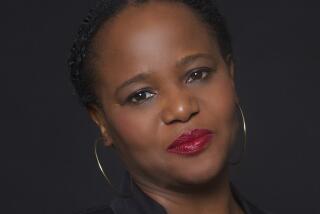Q&A:: The art of a revealing memoir: Terese Marie Mailhot and ‘Heart Berries’
Terese Marie Mailhot is from the Seabird Island Band in British Columbia, Canada. After serving as an editor at the Rumpus, columnist for Indian Country Today and faculty at the Institute of American Indian Arts, she has published her first book, the revealing memoir “Heart Berries.” The book — about motherhood, relationships, mental illness and sexual abuse — is poetic, urgent, short, brutal and at times darkly humorous.
Mailhot spoke with The Times over the phone from her home in West Lafayette, Ind., where she’ll begin teaching at Purdue in the fall. Our conversation has been edited. She’ll come to Los Angeles to talk about her book on June 28 with Roxane Gay at Aloud at the Central Library in downtown L.A.
Writing a memoir gives you control over your own narrative. It can be tempting to leave out ugly parts of yourself to seem likable on the page. But “Heart Berries” includes you giving someone a black eye and a moment when your son is crying in his crib and you put your hand over his mouth. Was it difficult to include that?
It was really hurtful to write that I had done those things. But I knew that if I wanted to write a book about my life I couldn’t position myself as a person who had always done the right thing. Part of healing is being accountable for what you have done. If I was able to reveal the ways in which I’ve failed myself and my children, I think it would help other people forgive themselves too. A lot of the final ideation is that people think the world would be better if they were gone. I wanted to retrieve that idea and deal with it and know that it was a lie. That nobody is too broken, nobody is too much. There were only two options: I either learn to grapple with the truth of my life, good and bad, or I end my life. A lot of that book is about suicidal ideation. I’m able to look at the ugliest parts of myself and not excuse it but look at it wholly and completely so that I never do it again. It could help other people — to know that they can transgress and they can will power into their lives to do better for people and to earn that forgiveness from their children or from themselves, even.
The book came out earlier this year. What has that been like?
When my book came out, I was so full of self-doubt. Now it is a success. Every day someone says something nice about how the book touched them, and only now do I really think I must have done something right. For me it has been profound to see people interacting with the text in this way.
How are people interacting with the book?
[At an event] I read “Thunder Being Honey Bear.” It’s one of the chapters that deals with sexual violence, and I read the line “nothing is too ugly for this world” and my eyes watered. When I went offstage, men came up to me to tell me that they wish they had that type of vulnerability. It was the first time I actualized that vulnerability was a gift and it was something that I should appreciate in myself. Seeing men — Native men especially — come up and talk about the fact that they identify with how I talk about dysfunction, having a broken heart or the things in my life that still haunt me has been really interesting for me because I didn’t expect it.
How has mental illness influenced your creative work?
My voice, depending on where I’m at and how I’m cycling in or out, it’s made it quicker or slower, more poetic or more frantic. For example, those passages about that brief moment where I hold my hand over my son’s mouth I realize that I was a horror to my children. In that moment, I’m expressing what it’s like to exist with postpartum bordering on psychosis. I’m expressing that and the only way I was able to write — plainly.
I had to write about mental illness in this way. Mental illness has inspired me because I had not read a book that dealt with motherhood, pain or sexual trauma in a self-effacing way like that before. I’ve never read a woman from a small community like mine who had worked her way up, got a GED and things like that. Because I had this diagnosis and I was dealing with this trauma I often looked for literature to inform how I would heal. I wrote the book to heal myself but also because I realized that there was nobody, really — no Native woman from a rez who was also a young mother who was also a welfare mom. I had never seen a text exist that shows you could make your life better from that point. For me, it was important to create it.
I’ve seen people write that this is a manifesto for Native girls, and I feel so scared of that because I don’t want Native girls to follow my footsteps.
— Terese Marie Mailhot
Many chapters are written to your partner, Casey. Did you have him in mind when you were writing?
The “Indian Sick” chapter begins as an epistolary piece to Casey about how I am not too much or too broken to be loved and accepted. By the end of that chapter, I realized that the piece is not about Casey at all but about my deepest memories of my father. It ends considering how one of my first memories is of my father beating my mother. Then it broadens the horizons for me artistically because I realized that this is not a book about unrequited love or a white man and a native woman. It is a book about the long shadows of shame, dysfunction, overcoming and transcendence. That was an epiphany for me that happened as I was writing it. I didn’t really consider the audience too much, but I knew that it was about more than just Casey.
You write, “My story was maltreated.” There is a fear of being misunderstood or not seen at all. In writing this memoir, has that changed?
I’ve moved from one label to another. Before I wrote the book, I could have easily been defined as a single mom, a mom on food stamps. And years before that, I was a welfare mom, an at-risk youth. After the book and as I was writing it, there were other labels like postdoctoral fellow, successful Native woman writer. These new labels are still hard to grapple with because they present new problems. No matter what, indigenous women have to deal with the fact that our stories occasionally will be maltreated even after we reach assemblages of success. I want to present a view of what it is like to be an indigenous woman existing in this moment in time. But I feel like the way people deal with my book, the way they interact with my text — I can’t control that. The book is a thing that can’t be dismantled and is always present, and I’m really happy for that. But I also know that the dangers of having a text that could be misinterpreted, like someone claiming that this is the representative experience of all Native women and that would be so dangerous. I’ve seen people write that this is a manifesto for Native girls, and I feel so scared of that because I don’t want Native girls to follow my footsteps.
You’ve written a book about being sexually abused and coming face-to-face with ugly qualities in others and ourselves. It has an introduction by Sherman Alexie, who was accused of sexual harassment after your book was published. Can you tell me about when you heard about the allegations and how you dealt with that?
I was on a date with my husband in Indy, and on my phone I read Elissa Washuta’s testimony on NPR. Washuta was the first person to ever give me an editing job at the Rumpus, and she’s also a prolific author who I idolized. When I read her testimony I felt broken and betrayed. I felt like I would never be able to trust another man who wanted to be a father figure in my life because I had never let anyone in as much as I let Sherman mentor me. I can’t speak to that relationship specifically because once I do I start stumbling into reflections that I’m not ready to make yet. It’s so stressful to consider that this man who wrote the introduction to my book, which is about sexual violence, had hurt women I care about deeply. With the Me Too movement, it’s ultimately good for indigenous women that we have a way to speak the truth of our lives. It’s important to believe testimony. When I read Elissa’s words, I went into shock and I feel like I’m still in that place where I can’t answer that question without feeling it again. I hope that people read Elissa’s work and I hope that people believe the work of women writers who have stood up against misogyny. I hope we give them space, and I hope that we appreciate their work and honor their voices. I can’t speak to anything else because it’s so difficult.
My father abused me. My father was also a prolific artist and rendered beauty in his work and I still keep one of his prints in my kitchen. I hung it there. I can’t say why I put it there. Maybe I put it there to remind myself of the fact that I can heal and that I can see parts of him that I want to keep. It’s difficult to talk about. It’s so personal and odd. I think it’s weird too that there is that introduction sitting there. I can’t wait for the new editions. The new editions of the book is just my text, no foreword or afterword.
The last author Q&A I did was with Junot Díaz. Whenever he is brought up in conversation, all I can say for certain is that I’m deeply disappointed.
Women, especially, are asked questions like what are we supposed to do with his work now? We shouldn’t be burdened with those questions as much as we should be allowed to mourn and deal with sexual violence, how it impacts our communities, and try to create safer communities. That is my focus right now. How do I become a mentor where I can rally for people to have a safer environment when they go to a writing conference, a residency or reading and they treat it like work. For a long time in my life I’ve seen people treat writing residencies, fellowships, conferences like it’s not work — where things that I don’t find appropriate happen, but if you speak out you’re just seen as prudish. It’s very important for women to know that we should have safe spaces at those conferences. People should be treating it like a job. For a long time, I existed in a space where people normalized things that were not OK. I want to create a better community with writers I admire like Roxanne Gay and Tommy Orange. Those are two people I trust and know that they demand better from their communities.
What has naming your pain done for you as a writer and in your personal life?
Naming how I felt subjugated or exploited in the past has helped me understand things about myself that I didn’t know — things that I resisted considering about my relationships with men or my relationships with people now. I feel like a better parent because I was able to write about experiencing postpartum depression. Something about interrogating those unhealthy spaces made it easier for me to guide myself into something better. To fully interrogate the worst parts of yourself, you are able to deal with it. Also, I know more about love now. I know more about consent. I know more about what I will into my life and what I won’t. It’s made me a stronger human being, which I appreciate.
Memoir is a lot of work in self-reflection. When did this level of introspection start for you?
When I entered my late 20s I found myself interested in my mistakes. I was finally done running — I spent most of my life either running away from a dangerous home life or running away from a young marriage that was dysfunctional or running away from case files that stigmatized me or running away from abusive men. In my late 20s I was not interested in running away from things. I wanted to just “settle down,” which was a really weird feeling for me because I never allowed myself stability and consistency and “normalcy.” I was ready to be accountable for the things that I willed into my life that were not healthy, and I was able to bear witness to the culprits that have harmed me. That was something I couldn’t have done in my early 20s because I don’t think I was strong enough to look back.
There is a passage where you imagine what your mother’s reaction would be to committing yourself to a mental institution. How is mental illness viewed in your family?
Within indigenous communities and with my specific community, when someone is not well in their heart and mind we have a phrase called Indian sick. That you need to spiritually cleanse yourself and you need to grieve if you have to grieve or deal with your pain through ceremony, so seeking therapy or going to a hospital sometimes sounds counterproductive to the people I grew up around because you are in a white building and people not from your culture are trying to help you relate to the world and understand it. But how could they know what genocide feels like? How could they know what our history of trauma feels like or even what it is like to be the first generation that didn’t have to go to residential school or Indian boarding school? It is very difficult to talk about intergenerational trauma in a white institution or mental health facility because they typically don’t understand the history of genocide. It was difficult for me. I have to find balance. I utilize therapy. I utilize medication. But I also pray. I also turn back to the teachings my mother gave me.
What’s teaching like for you?
I’m entering this new phase where I’ll be teaching and prepping for that coming in August. I’ve never taught at an institution like Purdue before and I teach creative writing right now at the Institute of American Indian Arts.
Teaching is nice because you get to lift up other writers and their writing. I’m really hard on myself, so being a teacher is a chance to be generous and good to somebody. Even in my criticism, sometimes I feel like I have been able to do it in a way — having been so hard on myself — I’m able to find ways to be better to students. It’s an opportunity to see people come into their own aesthetic. It’s a really cool thing to bear witness to.
You’ve talked about coming from a working-class background. Are you in a different tax bracket now and what is that experience like?
That is a crazy thing when you come from a community like I’m from. A lot of people of color, a lot of indigenous communities are collectives. They view their communities collectively and they view themselves in a plural way. They are only OK if their family is OK, if their community is OK. They see the broader view of the world. Succeeding is not supposed to be capitalistic. Succeeding means you bring up others. I’m trying to do that with my teaching. I’m trying to do that with my family. I’m trying to do that with my friends who live in indigenous communities and I’m able to help them and it’s good. It presents this whole new world where I can think about something bigger than just my survival, which I’ve never dealt with before. I can take a vacation. It’s a weird thing. All of a sudden I’m living in a suburban area and I have a good job. I have status and notoriety. I don’t know what to do with that. I’m hoping I do good things.
Castaneda is a writer in Los Angeles.
More to Read
Sign up for our Book Club newsletter
Get the latest news, events and more from the Los Angeles Times Book Club, and help us get L.A. reading and talking.
You may occasionally receive promotional content from the Los Angeles Times.








